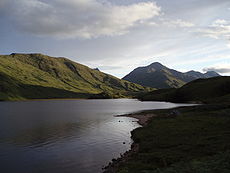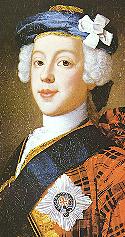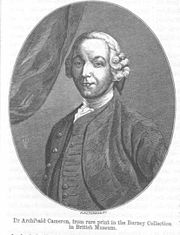
Loch Arkaig treasure
Encyclopedia

Spanish Empire
The Spanish Empire comprised territories and colonies administered directly by Spain in Europe, in America, Africa, Asia and Oceania. It originated during the Age of Exploration and was therefore one of the first global empires. At the time of Habsburgs, Spain reached the peak of its world power....
to finance the Jacobite rising
Jacobite rising
The Jacobite Risings were a series of uprisings, rebellions, and wars in Great Britain and Ireland occurring between 1688 and 1746. The uprisings were aimed at returning James VII of Scotland and II of England, and later his descendants of the House of Stuart, to the throne after he was deposed by...
in Scotland
Scotland
Scotland is a country that is part of the United Kingdom. Occupying the northern third of the island of Great Britain, it shares a border with England to the south and is bounded by the North Sea to the east, the Atlantic Ocean to the north and west, and the North Channel and Irish Sea to the...
in 1745, and rumoured still to be hidden at Loch Arkaig
Loch Arkaig
Loch Arkaig is a body of water in Lochaber, Scotland, to the west of the Great Glen. It is approximately 12 miles in length and lies 140 feet above sea level, the maximum depth is some 300 feet....
in Lochaber
Lochaber
District of Lochaber 1975 to 1996Highland council area shown as one of the council areas of ScotlandLochaber is one of the 16 ward management areas of the Highland Council of Scotland and one of eight former local government districts of the two-tier Highland region...
.
Background
In 1745, Prince Charles Edward StuartCharles Edward Stuart
Prince Charles Edward Louis John Casimir Sylvester Severino Maria Stuart commonly known as Bonnie Prince Charlie or The Young Pretender was the second Jacobite pretender to the thrones of Great Britain , and Ireland...
(Bonnie Prince Charlie) arrived in Scotland from France
France
The French Republic , The French Republic , The French Republic , (commonly known as France , is a unitary semi-presidential republic in Western Europe with several overseas territories and islands located on other continents and in the Indian, Pacific, and Atlantic oceans. Metropolitan France...
and claimed the thrones of Scotland
Kingdom of Scotland
The Kingdom of Scotland was a Sovereign state in North-West Europe that existed from 843 until 1707. It occupied the northern third of the island of Great Britain and shared a land border to the south with the Kingdom of England...
, England
Kingdom of England
The Kingdom of England was, from 927 to 1707, a sovereign state to the northwest of continental Europe. At its height, the Kingdom of England spanned the southern two-thirds of the island of Great Britain and several smaller outlying islands; what today comprises the legal jurisdiction of England...
and Ireland
Kingdom of Ireland
The Kingdom of Ireland refers to the country of Ireland in the period between the proclamation of Henry VIII as King of Ireland by the Crown of Ireland Act 1542 and the Act of Union in 1800. It replaced the Lordship of Ireland, which had been created in 1171...
, in the name of his father James Stuart
James Francis Edward Stuart
James Francis Edward, Prince of Wales was the son of the deposed James II of England...
(the Old Pretender). Although Charles asserted that his venture was supported by Louis XV of France
Louis XV of France
Louis XV was a Bourbon monarch who ruled as King of France and of Navarre from 1 September 1715 until his death. He succeeded his great-grandfather at the age of five, his first cousin Philippe II, Duke of Orléans, served as Regent of the kingdom until Louis's majority in 1723...
, and that the arrival of French forces
Military of France
The French Armed Forces encompass the French Army, the French Navy, the French Air Force and the National Gendarmerie. The President of the Republic heads the armed forces, with the title "chef des armées" . The President is the supreme authority for military matters and is the sole official who...
in Scotland was imminent, in truth France had little intention to intervene on the Stuarts' behalf. However, some limited financial support was supplied by both Spain and the Pope
Pope Benedict XIV
Pope Benedict XIV , born Prospero Lorenzo Lambertini, was Pope from 17 August 1740 to 3 May 1758.-Life:...
.
Spain pledged some 400,000 livres
French livre
The livre was the currency of France until 1795. Several different livres existed, some concurrently. The livre was the name of both units of account and coins.-Etymology:...
(or Louis d'Or
Louis d'or
The Louis d'or is any number of French coins first introduced by Louis XIII in 1640. The name derives from the depiction of the portrait of King Louis on one side of the coin; the French royal coat of arms is on the reverse...
) per month for the Jacobite cause. However, getting this money to the rebel army was the difficulty. The first instalment (sent via Charles' brother Henry
Henry Benedict Stuart
Henry Benedict Stuart was a Roman Catholic Cardinal, as well as the fourth and final Jacobite heir to publicly claim the thrones of England, Scotland, and Ireland. Unlike his father, James Francis Edward Stuart, and brother, Charles Edward Stuart, Henry made no effort to seize the throne...
who was resident in France) was dispatched in 1745. The French sloop
Sloop
A sloop is a sail boat with a fore-and-aft rig and a single mast farther forward than the mast of a cutter....
Hazard (renamed the Prince Charles) successfully landed its monies on the west coast of Scotland. Unfortunately for the Jacobites, the riches were soon captured by Clan Mackay
Clan MacKay
Clan Mackay is an ancient and once powerful Scottish clan from the far north of the Scottish Highlands, but with roots in the old kingdom of Moray. They were a powerful force in politics beginning in the 14th century, supporting Robert the Bruce. In the centuries that followed they were...
, who were loyal to King George II
George II of Great Britain
George II was King of Great Britain and Ireland, Duke of Brunswick-Lüneburg and Archtreasurer and Prince-elector of the Holy Roman Empire from 11 June 1727 until his death.George was the last British monarch born outside Great Britain. He was born and brought up in Northern Germany...
.
The treasure arrives

Battle of Culloden
The Battle of Culloden was the final confrontation of the 1745 Jacobite Rising. Taking place on 16 April 1746, the battle pitted the Jacobite forces of Charles Edward Stuart against an army commanded by William Augustus, Duke of Cumberland, loyal to the British government...
on 16 April, the ships left, unloading only the Spanish money at Loch nan Uamh, Arisaig
Arisaig
Arisaig is a village in Lochaber, Invernessshire, on the west coast of the Scottish Highlands.-History:On 20 September 1746 Bonnie Prince Charlie left Scotland for France from a place near the village following the failure of the Jacobite Rising. The site of his departure is marked by the Prince's...
on 30 April (the same place from where the Prince had disembarked the year before, and would later embark for France). Thus, seven caskets of Spanish gold arrived in Scotland. As the Jacobite cause was by then lost, with the army scattered and the Prince and his lieutenants in hiding, the money was to be used to assist the Jacobite clansmen (then being subjected to the brutalities of the government forces of the Duke of Cumberland
Prince William Augustus, Duke of Cumberland
Prince William , was a younger son of George II of Great Britain and Caroline of Ansbach, and Duke of Cumberland from 1726. He is generally best remembered for his role in putting down the Jacobite Rising at the Battle of Culloden in 1746, and as such is also known as "Butcher" Cumberland...
) and to facilitate the escape of leading Jacobites to the continent.
Six caskets (one having been stolen by McDonald of Barrisdale's men) were brought to Loch Arkaig (just north of Fort William) and hidden. Their secret was entrusted to Murray of Broughton
John Murray of Broughton
Sir John Murray of Broughton, 7th Baronet Stanhope was a Jacobite, who served as secretary to Prince Charles Edward Stuart during the Jacobite Rising of 1745...
, one of the Jacobite fugitives. Murray began the distribution to clan chiefs
Scottish clan
Scottish clans , give a sense of identity and shared descent to people in Scotland and to their relations throughout the world, with a formal structure of Clan Chiefs recognised by the court of the Lord Lyon, King of Arms which acts as an authority concerning matters of heraldry and Coat of Arms...
, but when he was apprehended by the government (and later turned state's evidence) the treasure was entrusted first to Locheil
Donald Cameron of Lochiel
Donald Cameron of Lochiel , was an influential Highland Clan Chief known for his magnanimous and gallant nature. His support of Charles Edward Stuart was instrumental in the Jacobite Rising of 1745...
, the chief of Clan Cameron
Clan Cameron
Clan Cameron is a West Highland Scottish clan, with one main branch Lochiel, and numerous cadet branches. The Clan Cameron lands are in Lochaber and within their lands is the mountain Ben Nevis which is the highest mountain in the British Isles. The chief of the clan is customarily referred to as...
, and then to Macpherson of Cluny, head of Clan Macpherson
Clan Macpherson
Clan Macpherson is a Highland Scottish clan from Badenoch, on the River Spey. It is a leading member of the Chattan Confederation.-Origins:...
. Cluny was hiding in a cave at Ben Alder
Ben Alder
Ben Alder is the highest mountain in the remote area of the Scottish Highlands between Loch Ericht and Glen Spean. The vast summit plateau is home of one of Britain's highest bodies of standing water, Lochan a' Garbh Coire. It is the 25th highest Munro, and due to its remote location, one of the...
, which came to be known as "the cage", and when Charles briefly joined him there, Cluny had control of the money, which was still hidden at Arkaig.
The treasure hunt

Frigate
A frigate is any of several types of warship, the term having been used for ships of various sizes and roles over the last few centuries.In the 17th century, the term was used for any warship built for speed and maneuverability, the description often used being "frigate-built"...
L'Heureux, and arrived back in France in September 1746. However, the fate of the money is not as clear. Cluny is believed to have retained control of it, and during his long years as a fugitive was at the centre of various futile plots to finance another uprising. Indeed he remained in hiding in his Highland "cage" for the next eight years. Meanwhile, a cash-strapped Charles was constantly looking for his money, and at least some of it came to him later, paying for the minting of a campaign medal
Campaign medal
A campaign medal is a military decoration which is awarded to a member of the military who serves in a designated military operation or performs duty in a geographical theater...
in the 1750s. However, it is said that all of the gold was never recovered. Charles, years later, accused Cluny of embezzlement
Embezzlement
Embezzlement is the act of dishonestly appropriating or secreting assets by one or more individuals to whom such assets have been entrusted....
. Whatever the case, the gold became a source of discord and grievance among the surviving Jacobites.
In 1753, Dr Archibald Cameron
Archibald Cameron of Locheil
Dr Archibald Cameron of Lochiel was a prominent leader in the Jacobite uprising of 1745 and the last Jacobite to be executed for high treason on June 7, 1753.-Before the uprising:...
—Locheil's brother, who was acting as secretary to the Old Pretender—was sent back to Scotland to locate the treasure. However, whilst staying secretly at Brenachyle by Loch Katrine
Loch Katrine
Loch Katrine is a freshwater loch in the district of Stirling, Scotland. It is roughly 8 miles long by 2/3 of a mile wide and runs the length of Strath Gartney...
, he was betrayed (apparently by the notorious "Pickle
Alestair Ruadh MacDonnell
Alestair Ruadh MacDonnell [or MacDonell] , chief of Clan MacDonell of Glengarry, a Scottish Jacobite who has been identified by Andrew Lang as the secret agent "Pickle," who acted as a spy on Prince Charles Edward after 1750.He was the third Lord MacDonell in the Jacobite Peerage.The family were a...
", a Hanoverian spy) and arrested. He was charged under the Act of Attainder for his part in the 1745 uprising and sentenced to death
Capital punishment
Capital punishment, the death penalty, or execution is the sentence of death upon a person by the state as a punishment for an offence. Crimes that can result in a death penalty are known as capital crimes or capital offences. The term capital originates from the Latin capitalis, literally...
, being drawn and then hanged on 7 June 1753, at Tyburn
Tyburn, London
Tyburn was a village in the county of Middlesex close to the current location of Marble Arch in present-day London. It took its name from the Tyburn or Teo Bourne 'boundary stream', a tributary of the River Thames which is now completely covered over between its source and its outfall into the...
(the last Jacobite to be executed).
The trail then goes cold. However, the Stuarts' papers (now in the possession of Queen Elizabeth II
Elizabeth II of the United Kingdom
Elizabeth II is the constitutional monarch of 16 sovereign states known as the Commonwealth realms: the United Kingdom, Canada, Australia, New Zealand, Jamaica, Barbados, the Bahamas, Grenada, Papua New Guinea, the Solomon Islands, Tuvalu, Saint Lucia, Saint Vincent and the Grenadines, Belize,...
) record a host of claims, counter-claims and accusations among the Highland Chiefs and Jacobites in exile, as to the fate of the monies. The historian Andrew Lang
Andrew Lang
Andrew Lang was a Scots poet, novelist, literary critic, and contributor to the field of anthropology. He is best known as a collector of folk and fairy tales. The Andrew Lang lectures at the University of St Andrews are named after him.- Biography :Lang was born in Selkirk...
(who was one of the first people to research the papers since Walter Scott
Walter Scott
Sir Walter Scott, 1st Baronet was a Scottish historical novelist, playwright, and poet, popular throughout much of the world during his time....
secured them for the Crown) recorded, in his book Pickle the Spy (1897), the sordid tale, and the involvement of both the Prince and his father in trying to locate the monies. The Stuart papers also include an account from around 1750, drawn up in Rome
Rome
Rome is the capital of Italy and the country's largest and most populated city and comune, with over 2.7 million residents in . The city is located in the central-western portion of the Italian Peninsula, on the Tiber River within the Lazio region of Italy.Rome's history spans two and a half...
by Archibald Cameron, which indicates that Cluny had not or could not account for all of it.
According to Clan Cameron records, some French gold coin
Gold coin
A gold coin is a coin made mostly or entirely of gold. Gold has been used for coins practically since the invention of coinage, originally because of gold's intrinsic value...
s were found buried in nearby woods in the 1850s.
In fiction
- The "Arkaig treasure" is featured in Nigel TranterNigel TranterNigel Tranter OBE was a Scottish historian and author.-Early life:Nigel Tranter was born in Glasgow and educated at George Heriot's School in Edinburgh. He trained as an accountant and worked in Scottish National Insurance Company, founded by his uncle. In 1933 he married May Jean Campbell Grieve...
's historical fictionHistorical fictionHistorical fiction tells a story that is set in the past. That setting is usually real and drawn from history, and often contains actual historical persons, but the principal characters tend to be fictional...
novel Gold for Prince Charlie. - The mising treasure features in Neil MunroNeil Munro (Hugh Foulis)Neil Munro was a Scottish journalist, newspaper editor, author and literary critic. He was born in Inveraray and worked as a journalist on various newspapers....
's novel Children of the Tempest, a love story set in the Outer Hebrides in the late 18th century. Published originally in 1903, rev.ed 2002.

